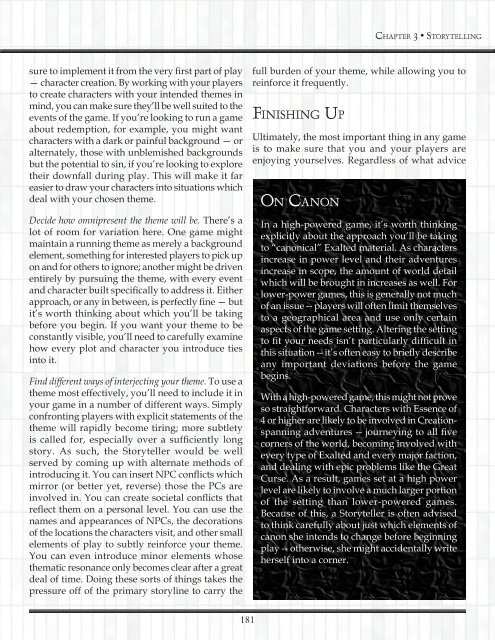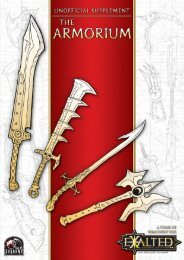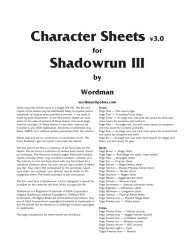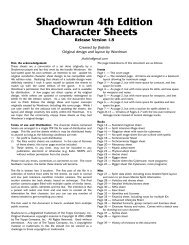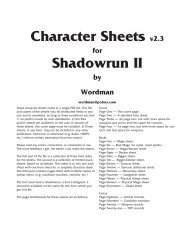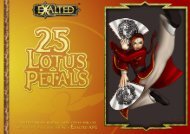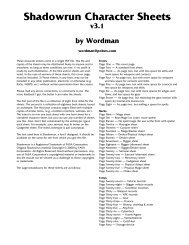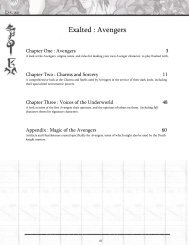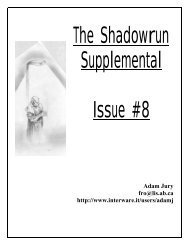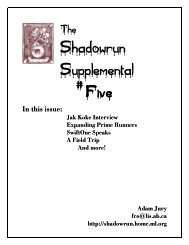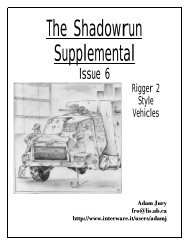sol invictus.indd
sol invictus.indd
sol invictus.indd
- No tags were found...
Create successful ePaper yourself
Turn your PDF publications into a flip-book with our unique Google optimized e-Paper software.
CHAPTER 3 • STORYTELLINGsure to implement it from the very first part of play— character creation. By working with your playersto create characters with your intended themes inmind, you can make sure they’ll be well suited to theevents of the game. If you’re looking to run a gameabout redemption, for example, you might wantcharacters with a dark or painful background — oralternately, those with unblemished backgroundsbut the potential to sin, if you’re looking to exploretheir downfall during play. This will make it fareasier to draw your characters into situations whichdeal with your chosen theme.Decide how omnipresent the theme will be. There’s alot of room for variation here. One game mightmaintain a running theme as merely a backgroundelement, something for interested players to pick upon and for others to ignore; another might be drivenentirely by pursuing the theme, with every eventand character built specifically to address it. Eitherapproach, or any in between, is perfectly fine — butit’s worth thinking about which you’ll be takingbefore you begin. If you want your theme to beconstantly visible, you’ll need to carefully examinehow every plot and character you introduce tiesinto it.Find different ways of interjecting your theme. To use atheme most effectively, you’ll need to include it inyour game in a number of different ways. Simplyconfronting players with explicit statements of thetheme will rapidly become tiring; more subtletyis called for, especially over a sufficiently longstory. As such, the Storyteller would be wellserved by coming up with alternate methods ofintroducing it. You can insert NPC conflicts whichmirror (or better yet, reverse) those the PCs areinvolved in. You can create societal conflicts thatreflect them on a personal level. You can use thenames and appearances of NPCs, the decorationsof the locations the characters visit, and other smallelements of play to subtly reinforce your theme.You can even introduce minor elements whosethematic resonance only becomes clear after a greatdeal of time. Doing these sorts of things takes thepressure off of the primary storyline to carry thefull burden of your theme, while allowing you toreinforce it frequently.FINISHING UPUltimately, the most important thing in any gameis to make sure that you and your players areenjoying yourselves. Regardless of what adviceON CANONIn a high-powered game, it’s worth thinkingexplicitly about the approach you’ll be takingto “canonical” Exalted material. As charactersincrease in power level and their adventuresincrease in scope, the amount of world detailwhich will be brought in increases as well. Forlower-power games, this is generally not muchof an issue -- players will often limit themselvesto a geographical area and use only certainaspects of the game setting. Altering the settingto fit your needs isn’t particularly difficult inthis situation -- it’s often easy to briefly describeany important deviations before the gamebegins.With a high-powered game, this might not proveso straightforward. Characters with Essence of4 or higher are likely to be involved in Creationspanningadventures -- journeying to all fivecorners of the world, becoming involved withevery type of Exalted and every major faction,and dealing with epic problems like the GreatCurse. As a result, games set at a high powerlevel are likely to involve a much larger portionof the setting than lower-powered games.Because of this, a Storyteller is often advisedto think carefully about just which elements ofcanon she intends to change before beginningplay -- otherwise, she might accidentally writeherself into a corner.181


